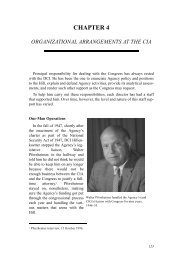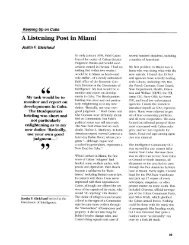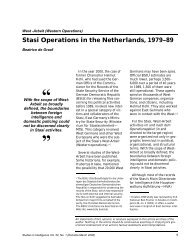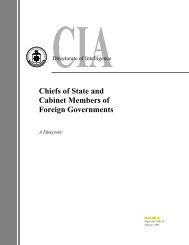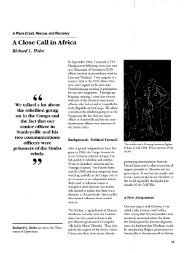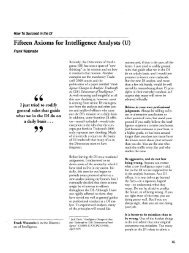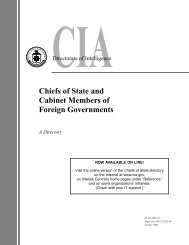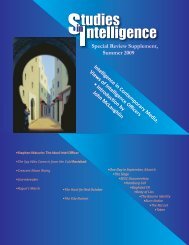Analytic Culture in the U.S. Intelligence Community (PDF) - CIA
Analytic Culture in the U.S. Intelligence Community (PDF) - CIA
Analytic Culture in the U.S. Intelligence Community (PDF) - CIA
You also want an ePaper? Increase the reach of your titles
YUMPU automatically turns print PDFs into web optimized ePapers that Google loves.
CHAPTER EIGHT<br />
often be hired on <strong>the</strong> spot. The cultural message <strong>in</strong> this case is that such<br />
employees are easily let <strong>in</strong> to and out of <strong>the</strong> organization.<br />
Ano<strong>the</strong>r, particularly pert<strong>in</strong>ent example is <strong>in</strong>telligence work, which requires<br />
that recruits undergo employment screen<strong>in</strong>gs unlike those found <strong>in</strong> most civilian<br />
jobs. Potential <strong>CIA</strong> analysts must submit to a thorough background <strong>in</strong>vestigation,<br />
a polygraph exam<strong>in</strong>ation, and f<strong>in</strong>ancial and credit reviews. Fur<strong>the</strong>r, a battery<br />
of psychological and medical exams must be passed prior to a formal<br />
employment offer. The timeframe for <strong>the</strong> background check elim<strong>in</strong>ates <strong>the</strong> possibility<br />
of a rapid hir<strong>in</strong>g decision. Even more important are <strong>the</strong> nonverbal messages<br />
sent to <strong>the</strong> recruit that this is a position of secrecy and high importance.<br />
Several sources of <strong>in</strong>formation contribute to beliefs about any organization.<br />
Friends or relatives who are already part of <strong>the</strong> organization might share <strong>the</strong>ir<br />
experiences with <strong>the</strong> person consider<strong>in</strong>g employment. Information might also<br />
be acquired from o<strong>the</strong>r sources, such as professional journals, magaz<strong>in</strong>es,<br />
newspaper articles, television, governmental and private Web sites, public<br />
statements or testimony, and annual reports. While <strong>the</strong>se sources of <strong>in</strong>formation<br />
about an organization are far from perfect (all may conta<strong>in</strong> positive and<br />
negative hyperbole), <strong>the</strong>y are still useful from <strong>the</strong> po<strong>in</strong>t of view of form<strong>in</strong>g<br />
prelim<strong>in</strong>ary ideas about what it might be like to work for that organization.<br />
Because competition for highly qualified employees is fierce, successful<br />
recruitment usually <strong>in</strong>volves a skillful comb<strong>in</strong>ation of salesmanship and diplomacy.<br />
Recruiters tend to describe <strong>the</strong>ir organizations <strong>in</strong> glow<strong>in</strong>g terms, gloss<strong>in</strong>g<br />
over <strong>in</strong>ternal problems and external threats, while emphasiz<strong>in</strong>g positive<br />
features. The result is that potential employees often receive unrealistically<br />
positive impressions of conditions prevail<strong>in</strong>g <strong>in</strong> a specific organization. When<br />
<strong>the</strong>y arrive on <strong>the</strong> job and f<strong>in</strong>d that <strong>the</strong>ir expectations are not met, <strong>the</strong>y experience<br />
disappo<strong>in</strong>tment, dissatisfaction, and even resentment that <strong>the</strong>y have been<br />
misled. In fact, research f<strong>in</strong>d<strong>in</strong>gs <strong>in</strong>dicate that <strong>the</strong> less employees’ job expectations<br />
are met, <strong>the</strong> less satisfied and committed <strong>the</strong>y are and <strong>the</strong> more likely<br />
<strong>the</strong>y are to th<strong>in</strong>k about quitt<strong>in</strong>g or actually to do so. 9<br />
These negative reactions are sometimes termed entry shock, referr<strong>in</strong>g to <strong>the</strong><br />
confusion and disorientation experienced by many newcomers to an organization.<br />
In order to avoid entry shock, it is important for organizations to provide<br />
job candidates with accurate <strong>in</strong>formation about <strong>the</strong> organization. Research<br />
supports <strong>the</strong> notion that people exposed to realistic job previews later report<br />
higher satisfaction and show lower turnover than those who receive glow<strong>in</strong>g,<br />
but often mislead<strong>in</strong>g, <strong>in</strong>formation about <strong>the</strong>ir companies. 10 Moreover, hav<strong>in</strong>g<br />
9<br />
John P. Wanous et al., “The Effects of Met Expectations on Newcomer Attitudes and Behavior:<br />
A Review and Meta-analysis.”<br />
10<br />
Bruce M. Megl<strong>in</strong>o et al., “Effects of Ralistic Job Previews: A Comparison Us<strong>in</strong>g an Enhancement<br />
and a Reduction Preview.”<br />
100






